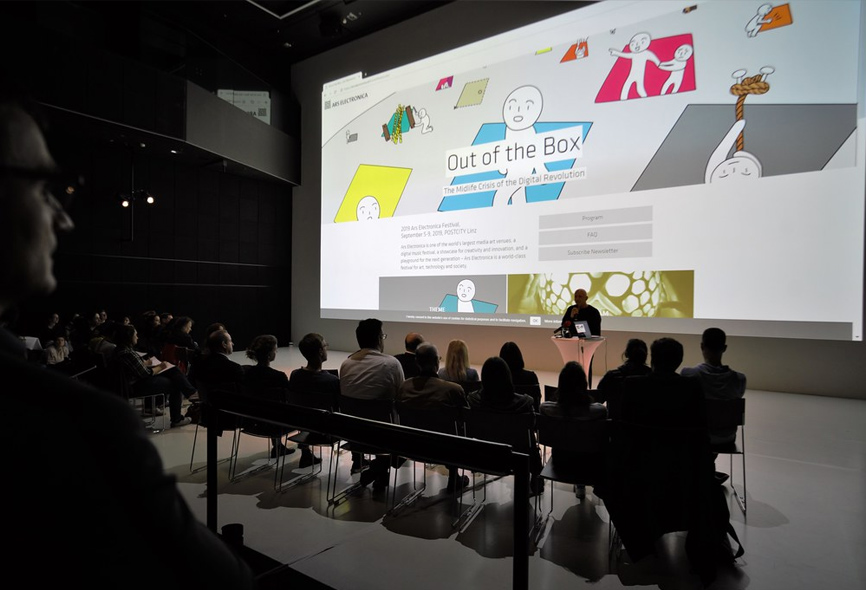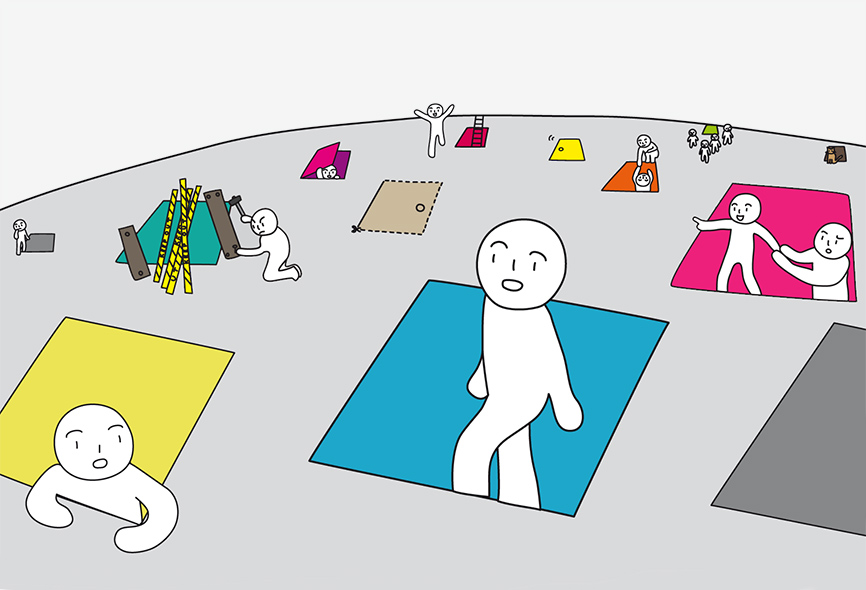The Digital Revolution has had a strong impact on our lives – reason enough to keep a close eye on these changes, analyze them and identify their effects and meanings. It is precisely this role that the artists at Ars Electronica have repeatedly played over the past 40 years and will continue to play in the years to come. “Out of the Box – the Midlife Crisis of the Digital Revolution” is intended to show that one does not automatically have to take on the role of passive victim, but on the contrary that one has to critically engage with development and play an active role in shaping our future. We spoke with Gerfried Stocker, artistic director of Ars Electronica, about the theme of the 2019 Ars Electronica Festival, which will take place from September 5 to 9, 2019 at POSTCITY Linz, among other venues.
40 Years of Ars, Electronica, Festival – 40 Years of Art, Technology, Society. How relevant is this interplay between these three areas today?
Gerfried Stocker: 40 years of Ars Electronica, that’s 40 years of Art Thinking. This is now an internationally established term that describes understanding the world through the eyes of art and transferring it to technological development and the future of society. Here, art is the “second opinion” for critical people; it is the second opinion on the Digital Revolution. After 40 years, this is something that has become quite clear just how incredibly great and viable the fundamental idea of Ars Electronica has become.
We live in a world where we always get a second opinion. And it took us so long to form an opinion about what is changing our world the most. These 40 years of Ars Electronica are 40 years of the Digital Revolution – an era in which computers and digital systems from industries and laboratories have entered our everyday lives. We are now at a transition. So far we have digitized everything that the industrial world already had, today our social relationships have also become digital.
If we compare 1979 and 2019, how has the Digital Revolution changed us?
Gerfried Stocker: There are many examples! With the smartphone 2019 each of us has a computer in her or his pocket. Nearly 4.5 billion people are connected to the Internet. You might think we’ve reached it now. There are more Facebook users than there are Christians in the world, the second largest human community. While religions have taken centuries to grow so large, social networks have done so in just a few years.
In 1979 Sony launched its first Walkman – now we can pack all the electronics, including our huge music library, into a small earplug. From the first personal computer to the smartphone, from clunky laptops to foldable screens, from portable mobile phones to smart watches… At that time you could transfer 300 bits per second with an optocoupler, today the fastest data lines allow over 1.6 terabits per second. In 1979, the Internet was only accessible via a few nodes – above all in the US – and today the world is incredibly networked across all continents. Digital corporations are increasingly displacing the traditional industries at the top of the world’s largest companies – among them more and more Asian corporations.
It has always been important for Ars Electronica not only to look at the Digital Revolution, but also at the massive and more powerful genetic revolution: Louise Brown was born in 1978 as the first test-tube baby, 40 years later there is a report from China that the world’s first genetically manipulated babies were born – using CRISPR technology, a genome was modified here to make them HIV-immune for the rest of their lives.
“The questions that we as a society will ask ourselves over the next 40 years, if we intervene in the human germ line, are probably the greater challenges than dealing with artificial intelligence.
The Ars Electronica Festival is also looking to the future – to what extent can we learn from the past?
Gerfried Stocker: We should not take the past 40 years as a model for the next 40 years. In 1979 Austria passed the Equal Treatment Act for the private sector, and 40 years later Austria ranks 53rd in the Global Gender Gap Report, which covers some 170 countries. The eighth richest country in the world is not in a position to achieve more equality between the sexes than place 53. In 1979, a huge demonstration by women in Tehran against forced veiling began. A comparative look at the satellite images of Austria’s highest mountain, the Großglockner, makes it frighteningly clear how rapidly the melting of the glaciers is progressing. In 1978 there was a referendum in Austria against the construction of the Zwentendorf nuclear power plant; now the young Greta Thunberg travels by train to Davos and triggers something that has meanwhile continued all the way to us, the Fridays for Future movement – a young generation that worries about the next 40 years.

What does all this have to do with “out of the box”?
Gerfried Stocker: “Out of the Box” can mean a lot: It’s about finished products that just have to be opened and can be used immediately. But that’s not how the digital revolution should be – we need technologies that we can design with and that we don’t just use to order something online. For us as a society, “out of the box” must mean: we have to get out of the cover, out of the comfort zone! And we can no longer be deluded into believing that we don’t have to take responsibility for what we’re about to launch.
What we are about to launch is this enormous development of artificial intelligence. In the next 40 years, if it is true, it will come to what is known as singularity – it will no longer just be about more intelligent and faster programs, but about something like raising awareness of digital systems. In the next 40 years, prototypes of a quantum computer could actually be part of reality.
What will surely occupy us in the next 40 years is that in the future we will not only be dealing with refugees from war and violence, but also with those people who are fleeing from the effects of climate change, which is destroying our planet more and more.
Fifty years ago, humans flew to the moon. It was here that the wonderful image of the Blue Planet was created from the outside, which led us to think about the environment in a completely new way. Now there are satellite images of our planet, which for example show the water temperatures and you can clearly see how far out into the ocean the water warming is already reaching.
“And, of course, the next 40 years will be about what Ars Electronica has always been doing: What does this interface, this coexistence of man and machine, look like?”
Who will be better – human or machine?
Gerfried Stocker: There are two good examples of this that are currently circulating virally as videos in the social media. One is the next development of Boston Dynamics, a humanoid robot that can jump over obstacles, and the other is the impressive performance of floor gymnast Katelyn Ohashi. Compared to humans, the technology still seems very clumsy.
But it’s not about whether machines or humans are better. What we need to get to in our thinking is exclusively a cultural achievement, which requires events like Ars Electronica and the thousands of artists who work with us: It’s no longer about human versus machine – both are top performances! Every detail of this robot can be traced back to human performance, as can the gymnast’s hard training work. With such an understanding we can go very well into the next 40 years. With “Out of the Box” this year we want to establish the basis for the next 40 years of Ars Electronica, to critically examine society and view reality through the eyes of art.

Gerfried Stocker is a media artist and telecommunications engineer. In 1991, he founded x-space, a team formed to carry out interdisciplinary projects, which went on to produce numerous installations and performances featuring elements of interaction, robotics and telecommunications. Since 1995, Gerfried Stocker has been artistic director of Ars Electronica. In 1995-96, he headed the crew of artists and technicians that developed the Ars Electronica Center’s pioneering new exhibition strategies and set up the facility’s in-house R&D department, the Ars Electronica Futurelab. He has been chiefly responsible for conceiving and implementing the series of international exhibitions that Ars Electronica has staged since 2004, and, beginning in 2005, for the planning and thematic repositioning of the new, expanded Ars Electronica Center, which opened its doors in January 2009.
From September 5 to 9, 2019, the Ars Electronica Festival in Linz, Austria, under the motto “Out of the Box – the Midlife Crisis of the Digital Revolution,” invites artists and scientists, engineers, designers, technologists, entrepreneurs and social activists from around the world to conferences, panel discussions, workshops, exhibitions, performances, interventions and concerts. You can find out more at ars.electronica.art/outofthebox!
